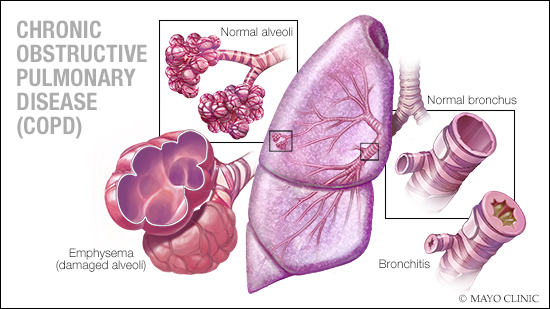-
Featured News
Mayo Clinic Q and A: Self-care steps and treatment can relieve COPD symptoms
 DEAR MAYO CLINIC: My father was just diagnosed with chronic obstructive pulmonary disease (COPD). He’s in his early 70s and has smoked for many years. How is COPD treated? Are there things he can do at home to ease his symptoms? His main issues are shortness of breath and a chronic cough.
DEAR MAYO CLINIC: My father was just diagnosed with chronic obstructive pulmonary disease (COPD). He’s in his early 70s and has smoked for many years. How is COPD treated? Are there things he can do at home to ease his symptoms? His main issues are shortness of breath and a chronic cough.
ANSWER: Treatment can relieve symptoms and slow the progression of COPD. And there are self-care steps your father can take to reduce symptoms, too. Healthy lifestyle choices, timely medical care and careful treatment planning all can help.
COPD damages the lungs. The disease blocks airflow within the lungs, making it hard to breathe. Symptoms usually start slowly and may get worse over time. COPD is caused by long-term exposure to irritating gases or particulate matter, most often from cigarette smoke.
Although there’s no cure for COPD, it is a treatable condition. Most people have mild COPD that is easy to treat. With appropriate therapy, even people with advanced COPD can see improvement in their symptoms.
Quitting smoking is by far the best way to prevent further damage to the lungs. After quitting smoking, lung function improves slightly. More importantly, it stabilizes to a normal rate of age-related decline. Among people with COPD who continue to smoke, lung function declines at about twice the normal rate. That causes more rapid progression of disease and greater likelihood of disability and death from COPD.
Treatment to reduce COPD symptoms includes several types of medication. A short-acting bronchodilator, such as albuterol, often is prescribed to relax the muscles around the airways. This can help relieve coughing and shortness of breath. If symptoms continue despite using albuterol, a long-acting bronchodilator, such as tiotropium or salmeterol, may be helpful.
If your father develops a bad chest cold with worsening COPD symptoms — these episodes sometimes are called exacerbations — it is important that he see his health care provider to be treated right away. That treatment may include an antibiotic or a steroid such as prednisone, or both. If he has more than one exacerbation a year, or an exacerbation for which he needs to be hospitalized, your father should talk to his health care provider about using an inhaled steroid regularly. This can decrease inflammation in the lungs, reducing the frequency and severity of exacerbations.
To help control COPD symptoms, it’s important for people with the disease to get a flu shot every year and keep their pneumonia vaccine up to date. A case of the flu or pneumonia can worsen respiratory problems and lead to hospitalization. Research has shown that getting a flu shot annually reduces by half the likelihood that people with COPD will need to be hospitalized due to respiratory problems.
Pulmonary rehabilitation can be helpful for some people with COPD. These programs include exercise and nutrition education, as well as guidance and advice on how to manage COPD to maintain normal routines and stay active.
In general, oxygen therapy and other more advanced treatment, such as surgery, are only needed when COPD becomes severe. But for individuals who require these treatments, they can effectively improve breathing and make day-to-day life with COPD easier.
As you and your father consider how to best manage his COPD, keep in mind that in addition to the respiratory symptoms it can cause, COPD also increases the risk of developing heart disease, lung cancer and various other conditions. That makes it important to get regular follow-up care, make healthy lifestyle choices and consistently take all medications as prescribed.
Effective treatment is available for COPD. To ensure the best outcomes, encourage your father to take an active role in his health care and talk to his health care provider about what he can do to stay as healthy as possible. — Dr. Paul Scanlon, Pulmonary and Critical Care Medicine, Mayo Clinic, Rochester, Minnesota
****************************
Related Articles
- Mayo Clinic Minute: What you need to know about COPD published 11/15/18
- New COPD guidelines from international panel provide updated recommendations published 9/19/18
- Mayo Clinic Q and A: COPD treatment with two types of bronchodilators published 1/31/17







